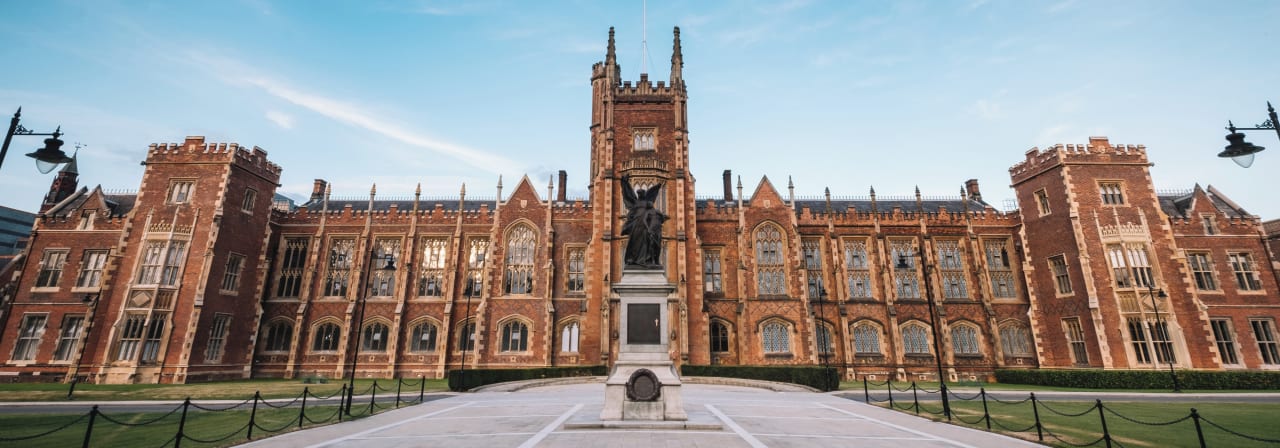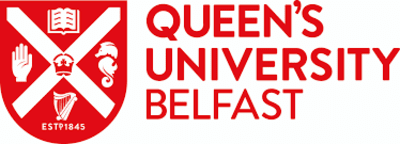
LLM Law and Technology
Queen's University Belfast

Key Information
Campus location
Belfast, United Kingdom
Languages
English
Study format
On-Campus
Duration
1 - 2 year
Pace
Full time, Part time
Tuition fees
GBP 19,100 / per year *
Application deadline
Request info
Earliest start date
Request info
* international fee
Introduction
This advanced programme helps students gain a deep appreciation of how the law interacts with technological innovation. What social challenges are posed by technological change? How does the law address those challenges? And what impact does technological innovation have on the practice of law?
Drawing on the School of Law’s substantial profile in technology, e-governance, intellectual property and innovation, students on the programme have the opportunity to develop specialist expertise in law, governance and the ‘fourth industrial revolution.’
The programme places employability skills at its heart. Employers are very interested in law graduates who are tech-savvy and are clear and comfortable communicators, whether with clients or more generally. We embed skills development directly into the curriculum as such, through project-based learning work, computational skills and elsewhere.
Law And Technology Highlights
Career Development
We are dedicated to student employability and have strong industry links. Law was ranked Top 10 in the UK for graduate prospects (Times and Sunday Times Good University Guide 2022) This employer-focused programme places employability skills at the core of the student experience (including problem-based learning and leadership modules), introducing students to the interplay of and interfaces between technology and law. Employers will be involved in assisting with project-based learning and in delivering guest lectures to students.
World Class Facilities
Our facilities at Queen’s include a state-of-art Law building with superb teaching facilities, a moot court and study spaces. Queen’s has one of the most modern campuses in the UK, including the award-winning McClay Library, one of the finest libraries in the world and home to 1.2 million volumes and over 2,000 reader places. Our Physical Education Centre was used as a training camp for the 2012 Olympics. Our Queen’s Elms Student Village and city centre student accommodation (built-in 2018) are located within easy walking distance of the University.
Internationally Renowned Experts
Law at Queen's is taught by world-leading experts in the area of Law. Our staff have close research links with the professions, government and Civil Society. Law at Queen's is in the top 150 Law Schools worldwide and we are ranked 19th in the world for global outlook. Research in Law was ranked 8th in the UK in the most recent Research Assessment Exercise (2021).
Student Experience
This programme will equip you with a thorough and crucial understanding of the key questions we face regarding regulation and governance technologies. You will possess a deep appreciation of matters in the regulation of technology, borne from both classroom and project-based experience. You will have developed a sophisticated sense of how technology interacts with law, but also a sense of how law and technology are operationalised in legal practice. At Queen's, you will be part of a thriving postgraduate culture built on teaching excellence, leading-edge research, innovation, collaboration and engagement. These components are woven together in our Graduate School. It is here you will develop new skills and increased personal effectiveness that will enable you to stand out in the crowded and increasingly competitive global job market. Life at Queen's is not just about the degree. We offer our students the opportunity to really enrich their studies. Whether you're into student societies, sports, music, dance, or just a coffee with your friends, Queen's has exceptional facilities to cater for all interests. Queen’s was ranked 9th in the UK for university facilities.
Admissions
Scholarships and Funding
How do I fund my study?
There are different tuition fees and student financial support arrangements for students from Northern Ireland, England, Scotland, and Wales (Great Britain), and those from the rest of the European Union.
Scholarships
Each year, we offer a range of scholarships and prizes for new students.
International Scholarships
Curriculum
Course Structure
Students may enroll on a full-time (1 year) or part-time (2 years) basis. Students must complete core modules (60 CATS points), optional modules (60 CATS points), and a research dissertation (60 CATS points).
The Master's is awarded to students who successfully complete all taught modules (120 CATS points) and a research dissertation (60 CATS points).
Compulsory Modules
- Law and the Challenges of Technology
- Regulating Innovation
- Law and Technology: Project-Based Learning
- Approaches to Legal Research
Dissertation (Maximum 15,000 words) (Students who secure a summer work placement of at least 8 weeks can complete a Dissertation in Practice Module including a 12,000-word dissertation and a 3,000-word reflective journal of the learning experience)
Optional Modules
- Computational methods and skills
- Foundations of Cybersecurity
- Copyright in the Digital Environment
- Business and Human Rights
- Advanced Issues in Medical Law and Ethics
- Leadership and Innovation Skills for Law Students
- Data, privacy, and the law
- Regulating digital communications
- Artificial Intelligence and the Law
Please note this is not an exclusive list of the optional modules available. Optional modules are reviewed each year and are subject to staff availability
Learning and Teaching
Learning opportunities associated with the course are outlined below:
Learning and Teaching Opportunities
The Law School at Queen's is ranked as one of the top 10 Law Schools in the UK (Complete University Guide 2023). There are 850 undergraduate students enrolled in the School, 200 postgraduates, 50 Ph.D. students, and over 60 members of academic staff. You will be taught by scholars from all over the world, many of whom have international reputations in their fields and all are committed teachers and researchers. Students will also have access to an excellent law section in the library and extensive IT facilities.
The School operates a proactive system of student support. Advisers of Studies are allocated to each degree program and tasked to guide and support you throughout your time with us, together with the School's experienced and helpful administrative staff. We place considerable emphasis on facilitating good communication between staff and students. To this end, a Staff-Student Consultative Committee, comprised of elected student representatives, the Director of Graduate Studies, and other members of academic staff, meets at regular intervals throughout the academic year. This Committee provides students with a forum in which to raise matters of concern to them and also enables the School to keep students informed about matters affecting the School and wider university.
Assessment
Assessments associated with the course are outlined below:
Assessed coursework
Program Tuition Fee
Career Opportunities
This employer-focused program places employability skills at the core of the student experience (including problem-based learning and leadership modules), introducing students to the interplay of and interfaces between technology and law.
Graduate Plus/Future Ready Award for extra-curricular skills
In addition to your degree programme, at Queen's you can have the opportunity to gain wider life, academic and employability skills. For example, placements, voluntary work, clubs, societies, sports, and lots more. So not only do you graduate with a degree recognized from a world-leading university, you'll have practical national and international experience plus a wider exposure to life overall. We call this Graduate Plus/Future Ready Award. It's what makes studying at Queen's University Belfast special.
English Language Requirements
Certify your English proficiency with the Duolingo English Test! The DET is a convenient, fast, and affordable online English test accepted by over 4,000 universities (like this one) around the world.